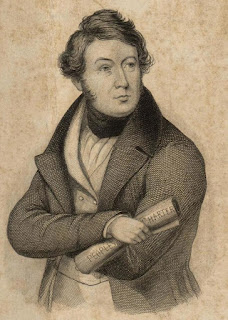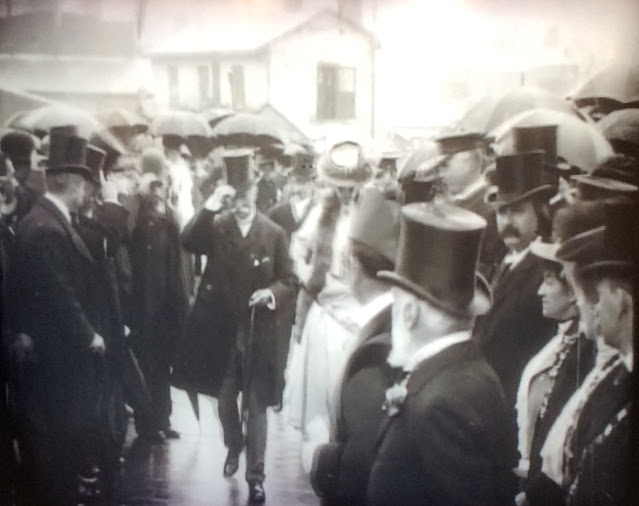John Frost's Return to Newport by Ray Stroud.
John Frost’s Return to Newport
On Monday 11 August 1856, John Frost returned to Newport for the first time in 17 years. He arrived from Bristol at about 3 pm that afternoon on a steam packet named the Swift.
 |
| John Frost in his later years |
A large crowd, estimated to be in the hundreds, waited for his arrival at the packet slip. Gathering on the town bridge and the banks of the River Usk, they soon recognised him. As the vessel came closer to the river bank, shouts of welcome were raised, and Frost and his friends on board the steamer responded.
A steam packet arriving in Newport
This was the last leg of a long journey back to his homeland. Having been exiled in Tasmania for his part in the Newport Rising of 1839, he had eventually received a pardon in 1854. This was largely due to the efforts of the radical MP, Thomas Duncombe, who had persuaded the Prime Minister, Lord Aberdeen, to grant Frost a pardon on the condition that he would never return to Britain. As a result, Frost left Hobart on 28 December 1854 and sailed for America with his daughter Catharine, who had joined him in Tasmania.
Together, they reached California in May 1855, and embarked on a short tour of the country. Here, Frost provided a series of lectures, organised by William Prouting Roberts, on the unfairness of the system of government in Great Britain. In November 1855, the London Morning Advertiser commented that,
Lord Palmerston could not perform a more generous or more popular act than to advise the Crown to grant Mr Frost an unconditional pardon, and thus enable him to revisit his native land, which he so loves, and in which he so earnestly wishes to die.
By June 1855 they had made their way to New York. It was here, almost a year later, that Frost received news of his free pardon, granted by Queen Victoria to mark the successful conclusion of the Crimean War.
During Frost’s years in exile, New York had become a sanctuary for many Chartists. Peter Bussey, for example, who had fled Britain in November 1839, had opened an Emigrant Boarding House with a fellow Chartist, Benjamin Worswick, in Front Street, close to the point where steamboats set out for the Western States.
But Frost had no intention of remaining in New York. On Saturday 12 July he arrived in Liverpool.
New York in 1855
Frost made a brief stay in London, meeting with Duncombe at the House of Commons. But he soon returned to his family in Stapleton, near Bristol. So much in his life had changed. His beloved wife, Mary, was very frail and would die within a year of his return. During his exile, his mother and three of his children had died. Another of his daughters, Ellen, had married William Davis of Blackwood, who had turned Queen’s Evidence in 1839. He decided that they should leave for Australia. Catharine also decided to return to Tasmania.
As he arrived back in Newport, he was confronted by a scene of change. While being transported to the Westgate Inn, he would have seen, for the first time, the railway bridge which now crossed the River Usk. Walking from the packet slip to the carriage that awaited him, he was informed of the many abuses in the town. He stated his intention to correct them. He spoke of the way in which the lands and funds of a charity school on Stow Hill had been disposed of. With the construction of Commercial Street on the land, he questioned the manner in which the Tredegar family, who were the trustees of the school, had disposed of these funds.
The Monmouthshire Merlin painted a very vivid picture of the scene that summer day:
He looked exceedingly well, and heartily shook hands with a number of persons who pressed forward for that purpose. Upon taking his seat in the carriage, which was decorated with evergreens and flowers, the horses were taken out, and the carriage was drawn by the people through the town, to the Temperance Hotel, Llanarth Street, where lodgings had been provided for Mr. Frost by the committee.
In the carriage with Mr. Frost, were Mr. Richard O'Rourke, who was described as ‘the oldest inhabitant’, Mr. Ingram, of Abergavenny, and another gentleman. When he eventually arrived at the Temperance Hotel, Frost delivered a short address to the crowd outside from one of the upstairs windows. A banner which carried the faces of Frost, Williams and Jones was suspended from a window. He soon told the crowd that, although he had been absent for seventeen years, he had returned as precisely the same man he was before he left; there was no change in him - there could be no change in a man whose convictions were based upon principle.
Frost stated his goal of producing a radical reform in the House of Commons and of abuses in general. He said that before he had left his native town of Newport he had been invested with legal authority, and his auditors were not to be surprised if they should hear of his being so invested again.
After a few further observations, he said he would take an opportunity of addressing the people at greater length on another occasion. Frost then withdrew from the window with the crowd cheering him once more.
On Wednesday 13 August, Frost returned to Bristol, where he lived until his death on 27 July 1877, at the age of 93.




Comments
Post a Comment